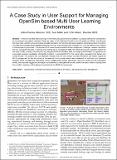Files in this item
A case study in user support for managing OpenSim based multi user learning environments
Item metadata
| dc.contributor.author | Perera, Galhenage Indika Udaya Shantha | |
| dc.contributor.author | Miller, Alan Henry David | |
| dc.contributor.author | Allison, Colin | |
| dc.date.accessioned | 2016-11-18T15:30:10Z | |
| dc.date.available | 2016-11-18T15:30:10Z | |
| dc.date.issued | 2017 | |
| dc.identifier | 247675766 | |
| dc.identifier | 544624bd-fa0e-4fd6-b5fe-b44ef7028c62 | |
| dc.identifier | 85030566768 | |
| dc.identifier | 000411845500008 | |
| dc.identifier.citation | Perera , G I U S , Miller , A H D & Allison , C 2017 , ' A case study in user support for managing OpenSim based multi user learning environments ' , IEEE Transactions on Learning Technologies , vol. 10 , no. 3 , pp. 342-354 . https://doi.org/10.1109/TLT.2016.2632126 | en |
| dc.identifier.issn | 1939-1382 | |
| dc.identifier.other | ORCID: /0000-0003-1209-9063/work/40546687 | |
| dc.identifier.uri | https://hdl.handle.net/10023/9846 | |
| dc.description | This research was supported by the Commonwealth Scholarship Programme (UK) and the Scottish Informatics and Computer Science Alliance (SICSA). | en |
| dc.description.abstract | Immersive 3D Multi User Learning Environments (MULE) have shown sufficient success to warrant their consideration as a mainstream educational paradigm. These are based on 3D Multi User Virtual Environment platforms (MUVE), and although they have been used for various innovative educational projects their complex permission systems and large numbers of functions can make their management potentially challenging. It follows that an inadequately managed MULE can be ineffective with respect to intended learning outcomes. The purpose of this research was to determine how management challenges manifest themselves and how to support educators in learning and applying MULE management skills. We utilized the popular OpenSim platform for this study. First, a survey of the need for user support (N=43) is described. Next, the design and evaluation of a guidance tool using graph topologic visualization of OpenSim functions is presented (N=211). The tool is further evaluated in the delivery of a course module. The analysis and user feedback indicated that the tool provides accurate information and helpful support for MULE management. As the final phase of the research, training environments were developed for both basic and advanced OpenSim MULE management. Evaluations of their usability and perceived educational value were carried out with participants (N=68); the outcomes suggest that training for advanced MULE management is more useful for all users, without requiring more time or effort, regardless of the degree of complexity of the MULE being designed. | |
| dc.format.extent | 1844868 | |
| dc.language.iso | eng | |
| dc.relation.ispartof | IEEE Transactions on Learning Technologies | en |
| dc.subject | Virtual Worlds | en |
| dc.subject | Immersive 3D learning environments | en |
| dc.subject | Immersive learning environment management | en |
| dc.subject | LB2300 Higher Education | en |
| dc.subject | QA75 Electronic computers. Computer science | en |
| dc.subject | NDAS | en |
| dc.subject | BDC | en |
| dc.subject | R2C | en |
| dc.subject | ~DC~ | en |
| dc.subject.lcc | LB2300 | en |
| dc.subject.lcc | QA75 | en |
| dc.title | A case study in user support for managing OpenSim based multi user learning environments | en |
| dc.type | Journal article | en |
| dc.contributor.institution | University of St Andrews. School of Computer Science | en |
| dc.contributor.institution | University of St Andrews. Centre for Higher Education Research | en |
| dc.contributor.institution | University of St Andrews. Centre for Ancient Environmental Studies | en |
| dc.identifier.doi | 10.1109/TLT.2016.2632126 | |
| dc.description.status | Peer reviewed | en |
This item appears in the following Collection(s)
Items in the St Andrews Research Repository are protected by copyright, with all rights reserved, unless otherwise indicated.

